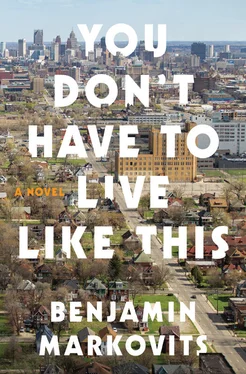Benjamin Markovits
You Don't Have to Live Like This
When I was younger I was never much good at telling stories. If I scored a goal at Pee Wee soccer, which didn’t happen often, I used to try and describe it for my brother over lunch, over the hot dogs and potato chips. Then he kicked it there and I ran here and he passed it to me there. My brother called these my “this and then this and then this” stories. I don’t know that I’ve gotten any better at it.
We shared a bedroom for years, but in sixth grade I moved into the backyard extension, built out of the old garage. It had its own door to the garden and on Saturday mornings kids used to leave their bikes outside and walk straight into my room. By that point I’d given up on soccer; my friends and I played a lot of Dungeons & Dragons. There would be six or seven boys sitting on my bed, on the floor, on the chair by my desk, with dice, pieces of paper, pencils and homemade maps. We kept the curtains closed and the lights on.
My parents began to worry about me, my mother especially. “You seem like a reasonable human being,” she liked to say. “You don’t look violent.”
I was kind of scrawny, blue-eyed and fair in the face but black-haired. My brother, who is three years older, belongs to a completely different physical type. Brad played tight end on his Pop Warner football team and might have started in high school, too, except my mother wouldn’t let him. When we were kids he used to sit on my chest with his knees on my puny biceps, trying to make me say stuff I didn’t want to say. “Dungeons & Dragons is gay. Say it.” If I refused, he’d kneel up on his weight until I squealed.
Most of my friends graduated to more strategically sophisticated games like BattleTech and Risk, but when I was fourteen or fifteen I realized that the real thing (war, I mean) was much more interesting than any fantasy. I started reading Churchill’s memoirs and Sandburg’s life of Lincoln. Probably my favorite battle of all time is the second El Alamein. Tank strategy in the Sahara turns out to be highly complex, and I checked out from the public library all the biographies of Lumsden and Montgomery I could lay my hands on. But I also had a soft spot for Nelson at Trafalgar and Meade at Gettysburg.
I didn’t wear fatigues around school or sign up for ROTC or anything like that. In most ways I was a pretty average nerd. Military history was just my nerd specialty. I got good grades. I played the trumpet in band. The only weird thing I did, apart from read books about war, was collect lead soldiers. My bedroom was full of these guys, arranged in actual troop formations on the windowsills and in my closet and on top of the chest of drawers. They freaked my mother out. She couldn’t understand why I spent so much time on what she called tiny metal dolls.
The truth is, I didn’t really understand it myself. My childhood was happy and suburban. I used to ride my bike to elementary school and when my brother and I were small we sometimes set up a lemonade stand in the front yard. When I was older, over the summer, I made six bucks an hour mowing lawns. My parents paid for everything else, but I had to pay for my “war shit” myself, my father said. Yard work in the heat of a Louisiana day was the only kind of suffering I put myself through as a kid. I probably dreamed about war because I wanted to know what I was made of — under the gun.
My mother hoped I’d grow out of it, and I guess I did. Two weeks before the start of freshman year, I wrapped the soldiers in cotton wool and packed them in shoe boxes. I didn’t particularly want to go to college, but my parents made me.
What do you want to do with yourself then, my dad asked.
“Don’t know,” I said. “In your day I might have got drafted.”
“Not if you went to college, you wouldn’t.”
He was a journalist and union organizer (from Montreal, originally); a tolerant, social, easygoing guy. Even as a kid I could tell that women liked him. But he didn’t know what to do with my obsessions.
“What’s going on here?” he said. “You want to enlist?”
“Mom would never let me. Besides, I’m too chickenshit. Guys from my high school have enlisted. Not my type. Anyway, it doesn’t have to be war. I’d be just as happy gold-rushing or homesteading or something.”
“I think you missed that train.” Later, he said, “I don’t understand what the hard work was for. All those grades.”
“You tell me, Dad. Getting grades is basically the only thing I know how to do.”
“So go to college,” he said.
My mom helped me pack and they put me on a plane to New York. It was my first time flying into JFK, but I didn’t go into the city. Instead I caught the Limo to New Haven, which sounds grand but was really just a regional bus service. You always had to wait for the bus to fill up — sometimes it took an hour, a bunch of kids sitting on their duffels. Six or eight times a year, for four years, I made that journey: in August and December, in the second week of January, after Thanksgiving or Spring Break, in June. Every time you go back home you feel a little older, every time you leave you feel younger again.
When I showed up at Yale I wasn’t ready for the chances that came my way. I didn’t even know what they were. Something in my personality had to change to make room for girlfriends, that much was obvious. But I didn’t realize until later that my classmates were checking out more than the opposite sex. They were looking for the kids who might cut a figure in the world one day: future senators, millionaires, newspaper editors, hotshot lawyers. It helps to know important, influential people. Some of them even hoped to become such people themselves.
Not me. I majored in history. I got more grades. I went through the usual transitions, involving girls and alcohol. In high school my friends and friendships were very innocent — my college friendships were less innocent. But I had a pretty good time. Even if the feeling didn’t go away, that there should be a better test of who I am than middle-class American life.
MAYBE THIS IS WHY, TWO days after graduation, two days after throwing my hat in the air, I flew to England. My brother was winding up a Rhodes Scholarship at Oxford before going to law school in Chicago. I lived with him for a couple of weeks, then took over the lease on his flat. It was one of these psychologically complicated family financial arrangements. I didn’t win any scholarships but my dad offered to pay my way. And what started out as an MSt in US history turned into a doctoral thesis and took up five years of my life. I liked Oxford. The big idea behind English postgraduate education is to leave you alone; this suited me fine.
For a while it seemed that all of that stupid homework was paying off. A suburban kid from Baton Rouge, going to Yale and Oxford, moving up in the world.
But after grad school nothing turned out quite right. It’s hard to get a job in America with a British PhD. I shifted to London and supported myself with adjunct teaching, while working my dissertation into a book. At least, that was the plan. In fact, all I did was teach. Since I was paid by the hour I had to put together a lot of hours. Eventually I landed a nine-month maternity cover in Aberystwyth, five hours by train from London — a midsize Welsh town, the kind of place you might go to for a weekend break. Good hiking territory. Wet suit surfing in the bay. I wanted a permanent job, but the department just kept renewing my short-term contract. They had me teaching heavy loads, running admissions, sitting on committees, doing the stuff that nobody else wanted to do.
Читать дальше












